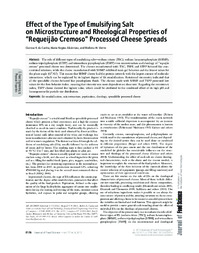Effect of the type of emulsifying salt on microstructure and rheological properties of "requeijão cremoso" processed cheese spreads.
Effect of the type of emulsifying salt on microstructure and rheological properties of "requeijão cremoso" processed cheese spreads.
Author(s): CUNHA, C. R. da; ALCÂNTARA, M. R.; VIOTTO, W. H.
Summary: The role of different types of emulsifying salts-sodium citrate (TSC), sodium hexametaphosphate (SHMP), sodium tripolyphosphate (STPP) and tetrasodium pyrophosphate (TSPP)-on microstructure and rheology of "requeijão cremoso" processed cheese was determined. The cheeses manufactured with TSC, TSPP, and STPP behaved like concentrated solutions, while the cheese manufactured with SHMP exhibited weak gel behavior and the lowest values for the phase angle (G"/G'). This means that SHMP cheese had the protein network with the largest amount of molecular interactions, which can be explained by its highest degree of fat emulsification. Rotational viscometry indicated that all the spreadable cheeses behaved like pseudoplastic fluids. The cheeses made with SHMP and TSPP presented low values for the flow behavior index, meaning that viscosity was more dependent on shear rate. Regarding the consistency index, TSPP cheese showed the highest value, which could be attributed to the combined effect of its high pH and homogeneous fat particle size distribution.
Publication year: 2012
Types of publication: Journal article
Unit: Embrapa Acre
Keywords: Citrato de sódio, Composición alimentaria, Composição de alimento, Creamy cheese, Emulsificadores, Emulsifiers, Food composition, Hexametafosfato de sódio, Pirofosfato tetrassódico, Processed cheeses, Propiedades rheológicas, Propriedade reológica, Quesos fundidos, Requeijão, Rheological properties, Sal emulsificante, Sodium citrate, Sodium hexametaphosphate, Sodium tripolyphosphate, Tetrasodium pyrophosphate, Tripolifosfato de sódio
Observation
Some of Embrapa's publications are published as ePub files. To read them, use or download one of the following free software options to your computer or mobile device. Android: Google Play Books; IOS: iBooks; Windows and Linux: Calibre.
Access other publications
Access the Agricultural Research Database (BDPA) to consult Embrapa's full library collection and records.
Visit Embrapa Bookstore to purchase books and other publications sold by Embrapa.

